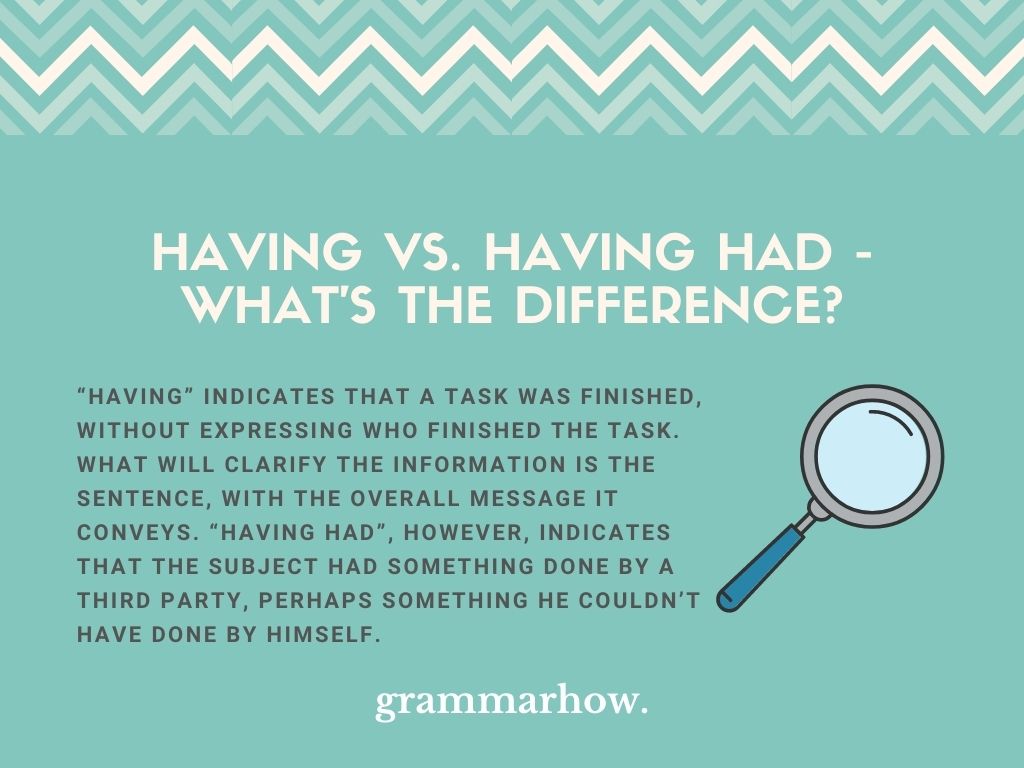What’s the difference between saying “Having” and “Having Had”? Some people might write off the latter by saying it sounds redundant, but we want to know more.
We’ll look into both forms, to see if both are correct or not. And if they’re, when and how we should use them.
Having vs. Having Had – What’s the Difference?
“Having” indicates that a task was finished, without expressing who finished the task. What will clarify the information is the sentence, with the overall message it conveys. “Having Had”, however, indicates that the subject had something done by a third party, perhaps something he couldn’t have done by himself.

Take a look at the examples, to try and clarify this concept a little, before moving forward:
- Having completed the task, Paul left the premises.
- Having had my appendix removed, I had a scar on my abdomen.
The first sentence indicates that after “Having” completed a task, Paul left the premises. “Having” by itself, or even the first part of the sentence, tell us very little about what took place.
The second sentence, however, states that the subject, “Having Had” their appendix removed, had a scar. The form “Having Had” indicates that someone else removed the appendix for them (since, indeed, no one does it by themselves).
“Having Had” brings more information to the sentence, helping the content of it make sense – as opposed to “Having” my appendix removed, which would likely sound incomplete.
What Does “Having” Mean?
“Having” is the present participle form of the verb “Have”. It may indicate possession or the completion of a task in the past – the latter form is used to illustrate how one task leads to a particular consequence or follow-up action.
Let’s look at some examples:
- Having a phone makes communication easier.
- Having a calculator makes math so much simpler.
- I was having a bad day.
- Having fallen from the bike, led to a painful recovery.
- Having chosen to go to college, Jenna had to leave home.
Sentences 1 to 3 show “Having “ as just indicating possession: the subjects had an item or a circumstance which they had to deal with.
Sentences 4 and 5 exemplify the use of “Having” to indicate how an act led to a consequential second act (indicated in the second half of the sentence).
Because I fell from the bike, I had a painful recovery. And because Jenna chose to go to college, she had to move out. It’s important to notice that using “Having” in this context, brings a more formal tone to the sentence. There’s certainly a more colloquial way to say the same thing.
What Does “Having Had” Mean?
“Having Had” indicates how one task led to a follow-up task, or how one initial action led to a second action that was taken. It works similarly to “Having” by itself, with some small differences.
“Having Had” can be redundant in some cases. When it happens, just “Having” would convey the same message, and “Having Had” could be too much (or unnecessary).
However, in some cases “Having Had” must be used in its complete form – mostly when it indicates that the first action was performed on the subject by a third person.
Let’s look at how to use “Having Had” in a sentence:
- Having had my nails done, the only thing left to do was hair.
- Having had the bathroom tile replaced, the house was ready to be sold.
- Having had to wait for days already, he was growing impatient.
- I was hired for the job, even without having had a second interview.
- Having had the opportunity to attend college, I was better prepared for life.
Is “Having Had” Grammatically Correct?
“Having Had” is grammatically correct. But you should keep in mind that it’s very formal and polished. You’d rarely see someone using that form in a casual, colloquial conversation. However, it’s correct and should be a tool you keep at hand, for when you need to address a demanding audience.
What Tense Is “Having Had”?
“Having Had” is in perfect participle tense, as follows: it contains “Having” plus a past participle verb (which, in this case, is “Had”). It’s very formal and polished, and likely wouldn’t be used in casual conversations. But it’s correct and proper.

Martin holds a Master’s degree in Finance and International Business. He has six years of experience in professional communication with clients, executives, and colleagues. Furthermore, he has teaching experience from Aarhus University. Martin has been featured as an expert in communication and teaching on Forbes and Shopify. Read more about Martin here.

